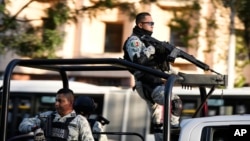The operation to detain Ovidio Guzman, the son of imprisoned drug lord Joaquin "El Chapo" Guzman, unleashed firefights that turned the northern city of Culiacan into a war zone with 30 dead, authorities said Friday.
In a blow-by-blow description of the battles Thursday that killed 10 military personnel and 19 suspected members of the Sinaloa drug cartel, Defense Secretary Luis Cresencio Sandoval said cartel gunmen opened fire on troops with a half-dozen .50-caliber machine guns.
The army responded by calling in Black Hawk helicopter gunships to attack a convoy of 25 cartel vehicles, including truck-mounted cartel gun platforms. The running shootouts also killed one Culiacan policeman and wounded 17 police officers and 35 military personnel.
The cartel opened fire on the military aircraft, forcing two of them down with "a significant number of impacts" in each of the two aircraft, Sandoval said. The gang then sent hordes of gunmen to attack fixed-wing aircraft, both military and civilian, at the city's international airport.
One civilian airliner was hit. The gunmen also shot up airport buildings in a bid to prevent authorities from flying the captured cartel boss out of the city. But, Sandoval said, authorities anticipating the resistance had loaded Ovidio Guzman onto a military helicopter to fly him back to Mexico City.
The Mexican administration captured the high-profile cartel figure days before hosting U.S. President Joe Biden.
Samuel Gonzalez, who founded Mexico's special prosecutor's office for organized crime in the 1990s, said Guzman's capture was a gift ahead of Biden's visit. The Mexican government "is working to have a calm visit," he said.
Juan Carlos Ayala, a Culiacan resident and Sinaloa University professor who studies the sociology of drug trafficking, said Ovidio Guzman had been an obvious target for years.
"Ovidio's fate had been decided. Moreover, he was identified as the biggest trafficker of fentanyl and the most visible Chapos leader."
Ayala said the atmosphere was calmer Friday, "but there are still a lot of burned-out vehicles blocking the streets."
The scope of Thursday's violence was such that Sinaloa Gov. Ruben Rocha said cartel gunmen showed up at local hospitals, trying to abduct doctors to treat wounded fighters. Rocha said that gunmen would be treated if they came to hospitals, but that gunmen shouldn't try to abduct medical personnel.
"It got to the point that at one moment the doctors were saying, 'We're getting out of here,'" Rocha said, adding that police reinforced security and convinced the doctors to stay.
Culiacan residents posted video on social media showing convoys of gunmen in pickups and SUVs rolling down boulevards in the city on Thursday. At least one convoy included a flatbed truck with a mounted gun in the back.
Unlike a failed 2019 attempt to arrest Ovidio Guzman — the government said it had to release him to avoid further bloodshed — this time around there were fewer civilian casualties: a 14-year-old boy was shot but expected to survive.
The September 2019 raid was in the city of Culiacan itself around midday, while Thursday's raid was around dawn in a more sparsely populated area to the north.
Victor Medrano, director of the Culiacan Chamber of Commerce, said that in 2019 "everything happened in broad daylight, and we were caught on the street or at work."
While most people stayed in their homes Thursday, by Friday people were starting to go back out on the streets, Medrano said.
"There is still some fear ... but as the day goes on, there are greater number of people out," he said.
Ismael Bojorquez, director of the crusading local newspaper Riodoce, said the cartel appears to have only grown stronger since 2019, when 13 people were killed in the failed raid.
"They (cartels) have taken advantage of these four years to organize themselves, arm themselves, strengthen their structures, their finances," he said. "I believe there are more weapons than three years ago. All of organized crime's armies have strengthened, not just the Chapitos, and this is the price that society is paying for this strategy of the federal government."
Thursday's violence was unusual in that it also targeted and forced the closure of Culiacan's airport, where one military plane and a civilian airliner were hit by bullets.
Guzman was indicted by the United States on drug trafficking charges in 2018. According to both governments, he had assumed a growing role among his brothers in carrying on their father's business, along with longtime cartel boss Ismael "El Mayo" Zambada.










